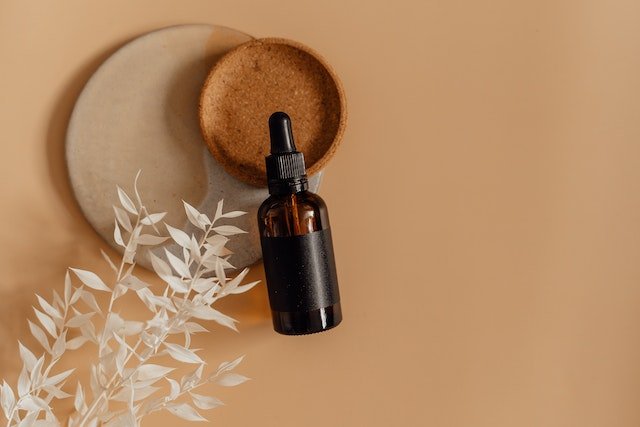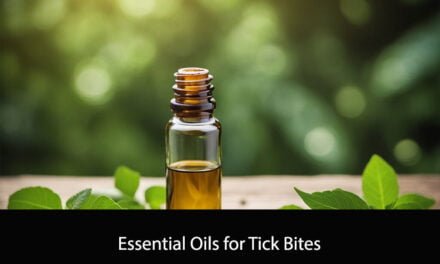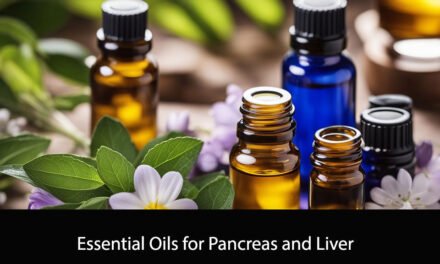Essential oils have been used for centuries to alleviate various ailments, including leg cramps at night. These cramps can be quite painful and disruptive, often waking sufferers from their sleep. While there are several over-the-counter medications that can provide relief, many people prefer natural remedies. Essential oils are one such solution that has gained popularity in recent years.
There are several essential oils that are known for their ability to ease leg cramps at night. Peppermint oil, for instance, has a cooling effect that can help reduce muscle spasms and promote relaxation. Lavender oil is another popular choice, as it has calming properties that can help soothe the body and mind. Other essential oils that have been used to alleviate leg cramps include chamomile, eucalyptus, and ginger. In this article, we will explore the benefits of these essential oils and how they can be used to relieve leg cramps at night.

Understanding Leg Cramps at Night
Leg cramps at night are involuntary muscle contractions that can cause discomfort or pain. They can occur in any part of the leg, from the calf to the thigh, and can last from a few seconds to several minutes. Leg cramps are more common in older adults, pregnant women, and people who are dehydrated or have certain medical conditions.
There are different types of leg cramps, including:
- Nocturnal leg cramps: These occur during sleep, usually in the calf muscles.
- Restless leg syndrome: This is a condition that causes an uncomfortable sensation in the legs and an urge to move them, often at night.
- Peripheral artery disease: This is a condition that causes reduced blood flow to the legs and can cause cramping and pain.
The exact cause of leg cramps is not always clear, but some factors that may contribute to them include:
- Dehydration
- Electrolyte imbalances (such as low levels of potassium, magnesium, or calcium)
- Muscle fatigue
- Poor circulation
- Certain medications (such as diuretics or statins)
- Medical conditions (such as diabetes or thyroid disorders)
If you experience leg cramps at night, it’s important to talk to your doctor to rule out any underlying medical conditions. In some cases, treating the underlying condition may help alleviate the cramps. In other cases, lifestyle changes and home remedies may be effective in managing leg cramps.
Essential Oils: A Brief Overview
Essential oils have been used for centuries for their therapeutic properties. They are highly concentrated plant extracts that can be used for a variety of purposes, including aromatherapy, massage, and skincare. When it comes to leg cramps at night, essential oils can be a natural and effective way to alleviate discomfort and promote relaxation.
There are many different essential oils that can be used for leg cramps, each with its own unique properties. Some of the most commonly used oils for this purpose include:
- Peppermint oil: Known for its cooling and soothing properties, peppermint oil can help to relax muscles and reduce inflammation.
- Lavender oil: With its calming and relaxing scent, lavender oil can help to promote restful sleep and relieve muscle tension.
- Eucalyptus oil: This oil has anti-inflammatory properties that can help to reduce swelling and pain in the legs.
- Rosemary oil: Known for its analgesic properties, rosemary oil can help to relieve pain and discomfort in the legs.
When using essential oils for leg cramps, it’s important to dilute them properly before applying them to the skin. This can be done by mixing a few drops of the essential oil with a carrier oil, such as coconut oil or jojoba oil. It’s also important to perform a patch test before using any new essential oil to ensure that you are not allergic or sensitive to it.
Overall, essential oils can be a safe and effective way to alleviate leg cramps at night. However, it’s important to use them properly and to consult with a healthcare professional if you have any concerns or underlying medical conditions.
Why Use Essential Oils for Leg Cramps
Leg cramps at night can be a frustrating and painful experience that can disrupt your sleep and leave you feeling tired and groggy the next day. While there are many over-the-counter medications and remedies available to alleviate leg cramps, many people prefer to use essential oils as a natural and holistic alternative.
Essential oils are concentrated plant extracts that have been used for centuries for their therapeutic properties. They are extracted from various parts of plants, including leaves, flowers, and roots, and are known for their anti-inflammatory, analgesic, and muscle-relaxing properties.
When it comes to leg cramps, essential oils can be particularly effective. They can help to soothe sore muscles, reduce inflammation, and promote relaxation, making them an excellent natural remedy for those who suffer from leg cramps at night.
Using essential oils for leg cramps is also a safe and natural alternative to traditional medications. Many over-the-counter medications can have unwanted side effects, and some can even be addictive. Essential oils, on the other hand, are non-addictive and have little to no side effects when used correctly.
Overall, using essential oils for leg cramps can be an effective and natural way to alleviate pain and discomfort. With their anti-inflammatory, analgesic, and muscle-relaxing properties, essential oils can help to soothe sore muscles, reduce inflammation, and promote relaxation, making them an excellent natural remedy for those who suffer from leg cramps at night.

Top Essential Oils for Nighttime Leg Cramps
If you suffer from nighttime leg cramps, you know how frustrating it can be to lose sleep due to muscle spasms. Fortunately, essential oils can be a natural and effective way to alleviate leg cramps and promote relaxation. Here are our top essential oils for nighttime leg cramps:
Lavender Oil
Lavender oil is known for its calming and soothing properties, making it an excellent choice for promoting relaxation and reducing muscle tension. It can help ease leg cramps by improving blood circulation and reducing inflammation. To use lavender oil for leg cramps, mix a few drops with a carrier oil such as coconut oil and massage onto your legs before bed.
Peppermint Oil
Peppermint oil is a popular choice for relieving muscle pain and tension. It has a cooling effect that can help reduce inflammation and promote blood flow to the affected area. To use peppermint oil for leg cramps, dilute a few drops with a carrier oil and massage onto your legs before bed.
Eucalyptus Oil
Eucalyptus oil has anti-inflammatory and analgesic properties that make it an effective remedy for muscle pain and cramps. It can also help improve circulation and reduce swelling. To use eucalyptus oil for leg cramps, mix a few drops with a carrier oil and massage onto your legs before bed.
Rosemary Oil
Rosemary oil is a natural muscle relaxant that can help ease tension and reduce pain. It also has anti-inflammatory properties that can help reduce swelling and improve circulation. To use rosemary oil for leg cramps, mix a few drops with a carrier oil and massage onto your legs before bed.
Incorporating these essential oils into your nighttime routine can help alleviate leg cramps and promote relaxation. Remember to always dilute essential oils with a carrier oil before applying to the skin and consult with a healthcare professional if you have any concerns or medical conditions.
How to Use Essential Oils for Leg Cramps
If you are experiencing leg cramps at night, essential oils may be able to help relieve your discomfort. There are two main ways to use essential oils for leg cramps: topically and through aromatherapy.
Topical Application
One way to use essential oils for leg cramps is through topical application. This involves diluting the essential oil with a carrier oil and massaging it into the affected area. Here are some steps to follow:
- Choose your essential oil(s). Some essential oils that may help with leg cramps include peppermint, eucalyptus, lavender, and marjoram.
- Dilute the essential oil with a carrier oil. We recommend using a 2-3% dilution ratio, which means adding 12-18 drops of essential oil per ounce of carrier oil. Good carrier oils include sweet almond oil, jojoba oil, and coconut oil.
- Massage the oil into the affected area. Use gentle, circular motions to help the oil absorb into your skin.
- Repeat as needed. You can apply the oil up to three times a day or as often as necessary to relieve your leg cramps.
Aromatherapy
Another way to use essential oils for leg cramps is through aromatherapy. This involves inhaling the essential oil(s) either directly or through a diffuser. Here are some steps to follow:
- Choose your essential oil(s). Some essential oils that may help with leg cramps include peppermint, eucalyptus, lavender, and marjoram.
- Decide how you want to inhale the oil. You can either inhale the oil directly from the bottle, add a few drops to a tissue or cotton ball, or use a diffuser.
- Inhale the oil. If you are inhaling directly from the bottle or a tissue, hold it about 6 inches away from your nose and take deep breaths. If you are using a diffuser, follow the manufacturer’s instructions.
- Repeat as needed. You can inhale the oil up to three times a day or as often as necessary to relieve your leg cramps.
Remember, essential oils are not a cure-all and should not be used as a substitute for medical treatment. If your leg cramps persist or are severe, please consult a healthcare professional.
Precautions When Using Essential Oils
When using essential oils for leg cramps, it is important to take certain precautions to ensure safe and effective use. Here are some things to keep in mind:
- Always dilute essential oils before applying them to the skin. Essential oils are highly concentrated and can cause skin irritation or other adverse reactions if used undiluted. A good rule of thumb is to use a carrier oil such as coconut or almond oil and mix in a few drops of essential oil.
- Do not ingest essential oils unless under the guidance of a qualified healthcare provider. Some essential oils can be toxic if ingested, and others can interact with medications or cause other health problems.
- Avoid using essential oils on or near sensitive areas such as the eyes, ears, or genitals. Some essential oils can be irritating or cause other adverse reactions in these areas.
- Always do a patch test before using a new essential oil. Apply a small amount of the diluted oil to a small area of skin and wait 24 hours to see if any adverse reactions occur.
- Keep essential oils out of reach of children and pets. Some essential oils can be toxic if ingested, and others can cause other health problems if used improperly.
- Store essential oils in a cool, dry place away from direct sunlight. Exposure to heat and light can cause essential oils to degrade and lose their effectiveness.
By following these precautions, you can safely and effectively use essential oils to help alleviate leg cramps at night.
Conclusion
In conclusion, essential oils can be a helpful and natural remedy for leg cramps at night. While more research is needed to fully understand the mechanisms behind their effectiveness, many people have reported relief from using certain oils.
When using essential oils for leg cramps, it’s important to dilute them properly and use them safely. Always consult with a healthcare professional before using essential oils, especially if you have any underlying health conditions or are taking medications.
Some of the most effective essential oils for leg cramps include peppermint, lavender, marjoram, and ginger. These oils can be diffused, applied topically, or added to a warm bath for maximum benefits.
In addition to essential oils, there are other natural remedies that can help alleviate leg cramps, such as stretching, staying hydrated, and getting regular exercise. By incorporating these practices into your daily routine, you may be able to reduce the frequency and severity of leg cramps and improve your overall quality of life.
Remember, while essential oils can be a helpful tool in managing leg cramps, they should not be used as a substitute for medical treatment. If you experience persistent or severe leg cramps, it’s important to seek medical attention to rule out any underlying health conditions.

Frequently Asked Questions
What are the best essential oils for muscle cramps at night?
There are several essential oils that are beneficial for muscle cramps at night. Some of the best essential oils for muscle cramps include lavender, peppermint, marjoram, and eucalyptus oil. These oils have anti-inflammatory and analgesic properties that help to relieve muscle cramps and spasms.
What are some effective ways to use essential oils for pain relief?
One of the most effective ways to use essential oils for pain relief is through massage. You can mix a few drops of essential oil with a carrier oil, such as coconut or jojoba oil, and massage the affected area. Another way to use essential oils for pain relief is through inhalation. You can add a few drops of essential oil to a diffuser or inhale the scent directly from the bottle.
What are the benefits of using essential oils for muscle pain?
Essential oils have several benefits for muscle pain. They have anti-inflammatory and analgesic properties that help to reduce pain and inflammation. They also promote relaxation and reduce stress, which can contribute to muscle pain.
What are some common causes of leg cramps at night?
Leg cramps at night can be caused by several factors, including dehydration, electrolyte imbalances, muscle fatigue, and poor circulation. Certain medical conditions, such as diabetes and peripheral artery disease, can also contribute to leg cramps.
What are some natural remedies for leg cramps at night?
In addition to essential oils, there are several natural remedies for leg cramps at night. These include stretching before bed, staying hydrated, taking magnesium supplements, and applying heat or cold to the affected area.
What are some tips for preventing leg cramps at night?
To prevent leg cramps at night, it is important to stay hydrated, maintain a healthy diet, and exercise regularly. Stretching before bed and wearing comfortable shoes can also help to prevent leg cramps.





